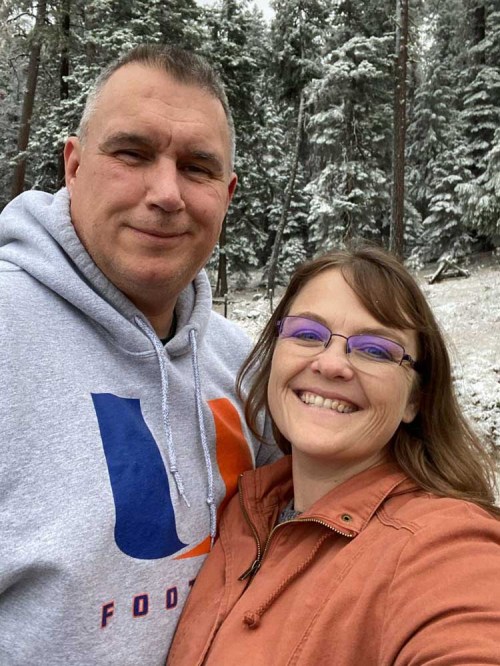Foster parents open their homes to kids in need
Published 6:00 am Tuesday, May 25, 2021

- Tonya Wilson and her husband, Gene, live in Hermiston and have been resource parents for about a year.
HERMISTON — For Bianca Osuna, being a foster parent is a dream come true.
“I know it sounds kind of cheesy, but I didn’t dream of being a firefighter when I was growing up, I dreamed of being a mom,” she said.
Trending
When Osuna didn’t end up having biological children, she turned to the foster care system three years ago as a way to still provide a home for children. Her first placement — a set of four siblings — lasted about a year. The Umatilla resident has continued to care for other children since, and said she has enjoyed the “ever-learning” experience.
Many of the children who come into her home after a last-minute phone call from the Oregon Department of Human Services are coming from very difficult situations, such as homes with drugs and abuse. Osuna said she has had to learn a lot about parenting in a different way than the way she was raised.
“People think, ‘How hard can it be? It’s just babysitting,’” she said. “But it’s not. It’s retraining the brain from trauma.”
Osuna has no regrets, however, about becoming what DHS now calls a “resource parent.” Even her first experience, when she went from having no children to having four dropped off at a moment’s notice, was a rewarding one she said she would do again. She enjoyed taking the kids around to their sports and other activities and spending time with them at home.
“I was like a chicken with my head cut off and I loved it,” she said.
There is plenty of support for resource parents, too, she said. Kids have case workers and court appointed special advocates and counselors, and parents have trainings and support groups. A new nonprofit called Sweet Potato’s Closet, which opened last year, provides a large selection of clothing, hygiene items and more for resource parents to stop by and pick things out for free.
Trending
If Osuna was asked to advise people who are thinking about doing foster care but are feeling intimidated, she said it would be that “the kids are worth it.”
“The journey isn’t a walk in the park by any means, but these kids deserve love and a safe place,” she said.
‘We need more kiddos’
Michelle Davis and her husband did foster care for the past two and a half years in Oregon, and for about three years before that while they were living in Kansas.
She and her husband have two biological children and live in Hermiston, but decided they had room in their home for more.
“We thought, you know what? We need more kiddos in the house,” she said.
The Davises have spent on average about a year with each child or sibling set they’ve taken into their home. They also frequently provide respite care, which provides temporary care for a child in the foster system while the person or family they are living with does something else, such as traveling out of town for a business trip.
Davis said if someone wants to dip their toe into the world of foster care to see how they like it, doing respite care for a day or two can be a good way to start.
There’s always a risk that biological children and foster children in the same home might not get along well, similar to biological siblings, but Davis said her children always have been great about accepting everyone.
“My oldest just turned 9 yesterday and he has the biggest heart of gold,” she said. “He just accepts anyone who comes in.”
She said the other day when she asked her 4-year-old where babies come from, he answered that someone comes and drops them off, of course.
No more empty nesters
Tonya Wilson and her husband are just coming up on one year of doing foster care. So far they have welcomed three teenagers, all related, into their Hermiston home.
“We’re empty nesters, and we suck at it,” she said when asked why they decided to get certified as foster parents. “It’s so quiet and empty.”
Wilson said it can take up to a year to get approved to be a foster parent, but in this case she and her husband were first approved as an emergency placement for a teen who had been living with some friends of hers who were moving out of state.
It hasn’t always been easy — there have been a few brushes with law enforcement — but Wilson said she and her husband love their kids and are glad to have them.
“Our daughter did the same kind of stuff to us, so sometimes I have to remember, ‘You’re talking back to us because you’re a teenager, not because you’re in foster care,’” she said.
She, Osuna and Davis all said they really enjoy the friendships they’ve made with other parents who are also doing foster care. There is a huge need for resource parents in the area, Wilson said, so she said if anyone is interested in giving it a try, it’s worth pursuing, even though it is an arduous process to get certified.
How to become a resource parent
May is National Foster Care Month, and Marvin Hamilton, who does recruitment for resource parents for DHS in Umatilla and Morrow counties, said he is grateful for all of the people who are willing to take a child or teenager into their home when living with their biological parents isn’t an option for the time being.
“They work hard to partner with families to offset the tremendous grief and loss children and young adults experiencing foster care may have,” he said. “They are partners in achieving the best possible outcomes for families while providing for the safety, health and well-being of the children and young people they’re committed to caring for in their home.”
He said there is a great need for more resource families in the area, and they are especially short on Spanish-speaking homes. He said Umatilla and Morrow counties have a total of 183 children in care and 131 resource families.
Resource parents can be single, married or living together, with biological children or without. They must be at least 21 years old, be able to adequately support their family financially, have adequate room for children in their home or apartment, be able to physically care for a child’s needs and pass a background check.
For more information, contact Hamilton at 541-564-4484 or Marvin.HAMILTON@dhsoha.state.or.us.









